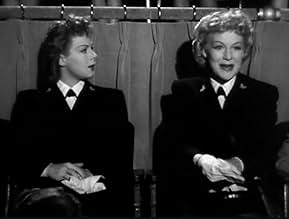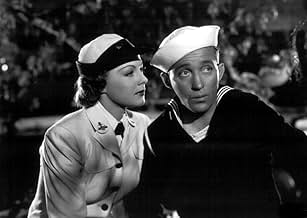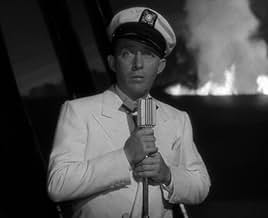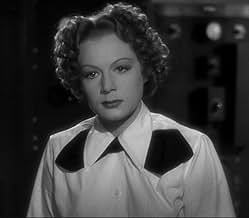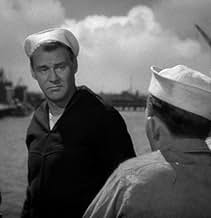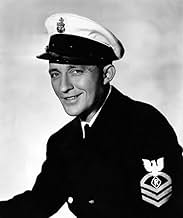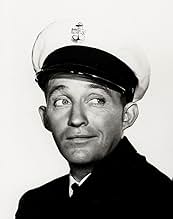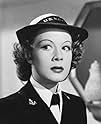Show business twin sisters Rosemary and Susie, one serious and the other a scatterbrain, join the WAVES and both fall in love with crooner Johnny Cabot.Show business twin sisters Rosemary and Susie, one serious and the other a scatterbrain, join the WAVES and both fall in love with crooner Johnny Cabot.Show business twin sisters Rosemary and Susie, one serious and the other a scatterbrain, join the WAVES and both fall in love with crooner Johnny Cabot.
- Nominated for 1 Oscar
- 1 nomination total
Anabel Shaw
- Isabel
- (as Marjorie Henshaw)
Terry Adams
- Wave
- (uncredited)
Harry Barris
- Bandleader
- (uncredited)
Carmella Bergstrom
- Wave
- (uncredited)
Lillian Bronson
- Johnny Cabot Fan
- (uncredited)
Charles D. Brown
- Capt. Johnson
- (uncredited)
Mae Clarke
- Ens. Kirk
- (uncredited)
Carmen Clifford
- Bit Part
- (uncredited)
Yvonne De Carlo
- Wave
- (uncredited)
Evelyn Dockson
- Undetermined Role
- (uncredited)
Mimi Doyle
- Johnny Cabot Fan
- (uncredited)
- Director
- Writers
- All cast & crew
- Production, box office & more at IMDbPro
Featured reviews
Bing Crosby stars in this paper-thin musical comedy which doubles as an all-out flag waving morale-builder for the war effort. Although it boasts a noteworthy Johnny Mercer score, and Crosby's buoyant personality, `Here Come the Waves' is marred by extreme predictability and a glaringly overexuberant turn by Betty Hutton.
Crosby stars as a popular singer and bobbysoxers' idol, in a quasi-parody of Sinatra or even Crosby himself. Despite his colorblindness, he enlists in the navy and becomes romantically involved with a pair of WAVES who happen to be twin sisters (both played by Hutton). This leads to the usual complications, schemes, mistaken identities, one-upmanship, hurt feelings, and reconciliations. Along the way, Crosby and the WAVES put on a gala production for the servicemen, which climaxes in a show stopping performance of `Accentuate the Positive.'
Crosby brings his routine charisma to the role, which fits him like a glove. He gets to croon several other memorable songs, including `That Old Black Magic' and `Let's Take the Long Way Home.' But Hutton throws herself completely into her role(s), and comes off as far too bubbly and high-strung. Whether she honestly felt that the part called for so much pep or if perhaps she was trying her best to steal scenes from Crosby I do not know, but regardless of her motivations it is just too much, as director Mark Sandrich should have realized and immediately corrected. I grant that in a movie like this the plot is of minimal importance and exists merely to hold the tunes together, but this premise is tired and stale, and all the plot twists can be predicted from a mile away. It's unabashedly patriotic and perfectly harmless enough as entertainment, but there's honestly nothing new here.
Crosby stars as a popular singer and bobbysoxers' idol, in a quasi-parody of Sinatra or even Crosby himself. Despite his colorblindness, he enlists in the navy and becomes romantically involved with a pair of WAVES who happen to be twin sisters (both played by Hutton). This leads to the usual complications, schemes, mistaken identities, one-upmanship, hurt feelings, and reconciliations. Along the way, Crosby and the WAVES put on a gala production for the servicemen, which climaxes in a show stopping performance of `Accentuate the Positive.'
Crosby brings his routine charisma to the role, which fits him like a glove. He gets to croon several other memorable songs, including `That Old Black Magic' and `Let's Take the Long Way Home.' But Hutton throws herself completely into her role(s), and comes off as far too bubbly and high-strung. Whether she honestly felt that the part called for so much pep or if perhaps she was trying her best to steal scenes from Crosby I do not know, but regardless of her motivations it is just too much, as director Mark Sandrich should have realized and immediately corrected. I grant that in a movie like this the plot is of minimal importance and exists merely to hold the tunes together, but this premise is tired and stale, and all the plot twists can be predicted from a mile away. It's unabashedly patriotic and perfectly harmless enough as entertainment, but there's honestly nothing new here.
7tavm
After years of knowing about this Bing Crosby-Betty Hutton movie musical, I finally got to see this on YouTube in an excellent print. Crosby plays a singer who all the women are crazy about-his character is possibly a parody of then-newcomer Frank Sinatra and his following though Der Bingle himself had a similar crowd when he was just starting out a decade before. One of those women happens to be one of the twin sisters Betty plays, the one who's the usual characterization of Ms. Hutton-all over the place emotionally-instead of the more serious and calm one. She's convincing in both roles. Many fine songs provided by Harold Arlen & Johnny Mercer including the Oscar-nominated song, "Ac-Cen-Tchu-Ate the Positive", which unfortunately is a little marred by the fact that Crosby and Sonny Tufts perform it in blackface. In summary, Here Come the Waves was a pretty funny movie and a nice tribute to the women in uniform during World War II. Oh, and I also liked the cartoon sets as drawn by Milt Gross.
My late aunt, Kathleen C. Quinn, was the technical advisor for "Here Come the Waves". She was a Lieutenant(jg) in the WAVES and was assigned to the movie. She said that the most difficult part of her job was in getting both the studio and the female cast, including Betty Hutton, to keep the hair styles within WAVE regulation length. (Regulation length was much shorter than the popular styles of the time.) She always told us that both Bing and Betty were very easy to work with.
This film should have worked. great Mercer score, Bing Crosby songs and Mark Sandrich directing.. but along comes Hutton to spoil the show.
Screeming like a demented banshee for much of the film, Hutton spoils what merit there is in the somewhat thin plot. Basically a flag waver along the lines of the earlier Crosby film "Star Spangled Rhythm" where Hutton also ruined the stirring Crosby number "Old Glory" again with her ear shattering screems, this film fails because someone failed to put prosac into Hutton's tea. If you can put up with Hutton then this makes for average rainy afternoon viewing. Bing deserved a better co-star than this and there were plenty around in 1944.
Screeming like a demented banshee for much of the film, Hutton spoils what merit there is in the somewhat thin plot. Basically a flag waver along the lines of the earlier Crosby film "Star Spangled Rhythm" where Hutton also ruined the stirring Crosby number "Old Glory" again with her ear shattering screems, this film fails because someone failed to put prosac into Hutton's tea. If you can put up with Hutton then this makes for average rainy afternoon viewing. Bing deserved a better co-star than this and there were plenty around in 1944.
A previous reviewer remarked that part of the plot involved Bing Crosby memorizing color tests to mask his color blindness to get in the Navy. In point of fact Bing was actually color blind. During the 1930s and 1940s it was not uncommon to see him photographed in a lot of loud and mismatched apparel which was a source of fodder for Bob Hope's monologues. The reason was he couldn't pick out matching stuff for his wardrobe.
Harold Arlen and Johnny Mercer wrote a great score for Bing and Betty Hutton to vocalize. Hutton manages to take her manic energy down a notch in the duet I'll Promise You with Bing. But Betty goes full blast on There's A Fella Waiting in Poughkeepsie. Bing has a nice solo ballad in Let's Take The Long Way Home.
The hit song of the movie was one of Bing's biggest Ac-cent-chu-ate the Positive. Johnny Mercer wrote that Bing was an instant study, he could hear a tune once and get it. He knew without being told where to come in on the downbeat. But you had to record him that first time if you wanted your version of the song. After that he started with the ad-libs his recordings are famous for.
The plot is easy to take and it allowed Crosby to satirize his up and coming rival Frank Sinatra. Too bad he never commercially recorded That Old Black Magic which was reprised for this film.
Harold Arlen and Johnny Mercer wrote a great score for Bing and Betty Hutton to vocalize. Hutton manages to take her manic energy down a notch in the duet I'll Promise You with Bing. But Betty goes full blast on There's A Fella Waiting in Poughkeepsie. Bing has a nice solo ballad in Let's Take The Long Way Home.
The hit song of the movie was one of Bing's biggest Ac-cent-chu-ate the Positive. Johnny Mercer wrote that Bing was an instant study, he could hear a tune once and get it. He knew without being told where to come in on the downbeat. But you had to record him that first time if you wanted your version of the song. After that he started with the ad-libs his recordings are famous for.
The plot is easy to take and it allowed Crosby to satirize his up and coming rival Frank Sinatra. Too bad he never commercially recorded That Old Black Magic which was reprised for this film.
Did you know
- TriviaOne of over 700 Paramount Productions, filmed between 1929 and 1949, which were sold to MCA/Universal in 1958 for television distribution, and have been owned and controlled by Universal ever since; its earliest documented telecast took place in Seattle Thursday 23 October 1958 on KIRO (Channel 7); it first aired in Phoenix Wednesday 19 August 1959 on KVAR (Channel 12); it was released on DVD 14 November 2006 as one of 5 titles in Universal's Bing Crosby Screen Legend Collection, and again 11 November 2014 as one of 24 titles in Universal's Bing Crosby Silver Screen Collection.
- GoofsWhen Betty Hutton begins to write a letter, she is shown in medium shot and she is obviously just scribbling on the paper, but after the cut to an over-the-shoulder shot, the writing does not match and it is neat and legible.
- ConnectionsFeatured in How Hollywood Twins Scenes Have Evolved Over 100 Years (2021)
Details
- Runtime
- 1h 39m(99 min)
- Color
- Aspect ratio
- 1.37 : 1
Contribute to this page
Suggest an edit or add missing content

